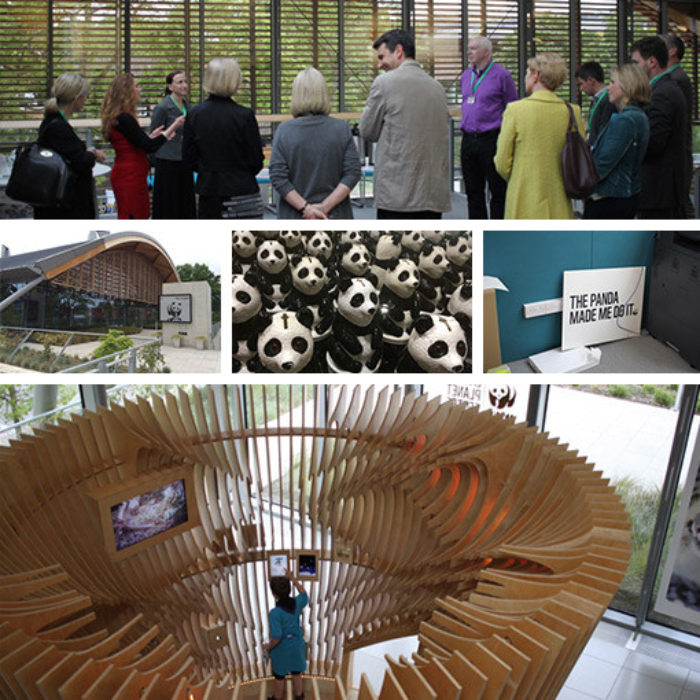Ten behavioural insights to overcome eco-anxiety
Ten behavioural insights to overcome eco-anxiety
It’s hardly surprising that we are suffering from eco-anxiety, described by climate psychologists as “a chronic fear of environmental doom” in response to dangerous changes in the climate system1.
As we approach COP 26, the lobbying landscape is getting louder by the day as politicians, businesses, NGO’s, and citizens everywhere outline demands and commitments. The barrage of negative context can feel overwhelming.
A few recent headlines:
“Top scientists warn that the planet is facing a ‘ghastly future of mass extinction’ declining health and climate-disruption upheavals” that threaten human survival because of ignorance and inaction according to Frontiers in Conservation Science”.
“Climate crisis already hitting ‘worst case scenario’, warns Environment Agency chief Sir James Bevan at the ABI conference, as extreme flooding in UK indicates urgent need for change if humanity is to survive”.
Even Sir David has said it’s already too late.
Sir David Attenborough speaking to the UN Security Council Climate summit: “climate change is the biggest threat to security that modern humans have ever faced… no matter what we do now, it’s too late to avoid climate change and the poorest, the most vulnerable, those with the least security, are now certain to suffer.”
Despite the rhetoric, commitments made so far are woefully inadequate. A UNFCCC study of 48 national decarbonisation plans in Feb 2021 found that these will only reduce emissions by 1% this decade – far short of the 45% reductions needed by 2030 to put the world on a 1.5C trajectory, as recommended by the IPCC’s 2018 report.2
For those of you who want reminding, check out the facts on why we need to act much faster:
– Too many of us humans – the UN 2019 World Population Prospects says 10 billion3 of us by 20504
– Uncontrollable consumption – we’re using 60% more resources than can be renewed, the equivalent of 1.6 earths, It takes us around 8 months to consume more resources than our planet produces in a year5
– Eco-system destruction and pollution of our air, land and water – 36 football fields’ worth of trees are lost every minute due to deforestation6 to convert land to produce commodity crops that feed the animals on our plates. By 2050 there will be more plastic in the sea than fish7
– biodiversity loss – a 68% decline in populations of mammals, birds, reptiles, fish and amphibians, with 1,000,000 species threatened with extinction8
– health impacts and pandemics – more zoonotic diseases like Covid9
– food insecurity with potential famine “of biblical proportions10” and almost 6 billion people facing water shortages by 205011
– extreme weather – more storms, floods, hurricanes, wildfires, droughts and heatwaves “will kill more people than most wars have”12
– rising sea levels “will take out most of the world’s cities, displace millions, and make much of the rest of our land surface uninhabitable”13
– social unrest – Intensifying climate change will increase future risks of armed conflict14. Of the 20 countries ranked most vulnerable to rising global temperatures, 12 are already in conflict.15
Gulp. No wonder 55% of us say we feel anxious because climate change has impacted on our wellbeing16. It’s normal to be scared, sad and downright angry about how we have all allowed this to happen to some extent or another. We’re facing big losses – the loss of our homes, our futures, our health, our trust in humanity, our wildlife, our planet. Some of us knew that our daily habits and choices weren’t the greenest, but we carried on anyway, often feeling a gnawing sense of guilt, but freezing in helplessness in the face of such a big, complicated, distant problem.
Yet I’m filled with a sense of hope that our collective angst will finally mobilise us into action. Behavioural scientists know how to do this. Here are 10 behavioural insights to drive climate action:
1. Chunk the problem down into bite sized pieces to make it manageable. Setting specific achievable behavioural goals with a clear plan to get there helps us feel more in control.
2. Reframe choices: Focus on signposting Climate positive behaviours rather than the personal sacrifice of “less” which can create reactance. Flip the narrative to focus on “more” ways to drive collective climate action at scale, e.g. through co-purchasing green energy or food.
3. Harness social norms – Evidence shows that “the strongest predictor of pro-environmental behaviours is your belief that other people are doing them and think you should too”17. To drive change, it is crucial to observe that others are acting, for example visible virtue signalling using green number plates on electric vehicles. Creating community connections is important for mutual support, for example through climate cafes or conservation groups.
4. Change the default –WeWork now only reimburses colleague expenses for vegetarian food, and not meat. Consider automatic carbon offset when buying products and services with the option to opt out rather than opt in. Remove the unsustainable option altogether, such as single use plastics. Make climate friendly options cheaper, e.g. through reducing VAT on green products and services and a carbon tax on intensive products like meat as recommended by the Environmental Audit Committee18.
5. Leverage the scarcity bias – we have an innate tendency to put a higher value on things when we believe they are scarce. Not only are resources running short, but time is scarce too, highlighting the need for action now.
6. Signpost sustainable substitutes – it is often easier to replace behaviours, rather than giving them up completely, e.g. plant based meals, however, beware of substituting one problem for another. According to WHO, “One of the greatest risks to planetary and human health is a global and poorly regulated agri-food system”.
7. Focus on local, personal tangible actions and impacts – climate interventions are most effective when messaging is personal and local showing impacts on me, my family and my community.
8. Use timely moments – targeting people at the right time makes a big difference, for example people are more likely to shift to active travel when they have recently moved house. Timely feedback also matters, e.g. through smart meters within home displays to show water and energy consumption.
9. Lobby for radical transparency – the Task Force on Climate-related Financial Disclosures19 has increased reporting of climate-related financial information to meet the needs of Financial markets
10. Celebrate success – It is important to record every little bit of progress and reinforce the message that small actions add up to a big difference.
The climate crisis is no longer abstract, distant and creeping, but very real in the here and now. According to Boris Johnson, “at COP26 in Glasgow, we may have our last opportunity to make the necessary step-change.” Please do not waste this chance.
If you are suffering from eco-anxiety or would like to talk to somebody about the issues raised, contact the Climate Psychology Alliance.
Sources:
1https://www.apa.org/news/press/releases/2017/03/mental-health-climate.pdf
2https://www.ipcc.ch/2018/10/08/summary-for-policymakers-of-ipcc-special-report-on-global-warming-of-1-5c-approved-by-governments/
3https://population.un.org/wpp/Publications/Files/WPP2019_10KeyFindings.pdf
4https://www.weforum.org/agenda/2018/10/david-attenborough-warns-planet-cant-cope-with-overpopulation/
5https://resource.co/article/earth-overshoot-day-falls-three-weeks-later-year-are-we-really-making-progress
6https://www.conservation.org/stories/11-deforestation-facts-you-need-to-know
7https://www.ellenmacarthurfoundation.org/publications/the-new-plastics-economy-rethinking-the-future-of-plastics-catalysing-action
8https://ipbes.net/news/Media-Release-Global-Assessment.
9https://www.bmj.com/content/371/bmj.m3389
10https://news.un.org/en/story/2020/04/1062272
11https://www.nature.com/articles/s41545-019-0039-9
12https://www.gov.uk/government/speeches/watching-the-wolf-why-the-climate-emergency-threatens-us-all
13ibid
14https://www.nature.com/articles/s41586-019-1300-6
15https://news.sky.com/story/attenboroughs-stark-warning-on-climate-change-its-already-too-late-12226694
16https://www.bacp.co.uk/news/news-from-bacp/2020/15-october-mental-health-impact-of-climate-change/ October 2020 British Association for Counselling and Psychotherapy (BACP) Survey, conducted by YouGov
17https://rare.org/wp-content/uploads/2019/02/2018-CCNBC-Report.pdf
18https://committees.parliament.uk/committee/62/environmental-audit-committee/publications/
19https://www.fsb-tcfd.org/



